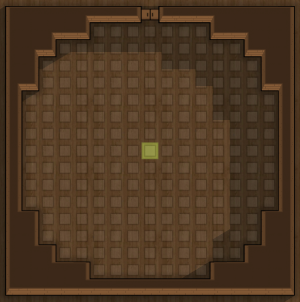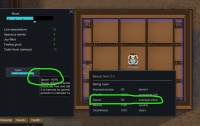Space
Space is the name for two separate elements of the game which are easily confused and not directly related. So, depending on context, "Space" can mean either:
- a colonist's need for Space
- the environmental concept of the amount of space in a particular room, one of the room stats
The first deals with whether a colonist feels their environment is/not open enough, whether they feel that "the walls are closing in" where they spend their time. The second deals with the usable size of a particular room, as one of four stats that together determine the overall impressiveness of that room.
Need for Space
Space is one of the needs that pawns have. The Space need is satisfied according to the number of tiles the pawn can walk to within a radius of 7 (193 tiles total). The need is 100% satisfied if there are 99 or more such tiles, and 0% satisfied if there are 3 or fewer.
Spaces with objects that pawns can walk through, like furniture, benches and trees, still apply towards this stat. Objects that cannot be walked through and act essentially as walls, like the nutrient paste dispenser, do not count towards this stat.
The Space need is always 100% satisfied when outdoors, regardless of the amount of accessible space near a player. A pawn in a doorway counts tiles on both sides of the door towards Space satisfaction, even if one or both sides of the door are outdoors.
Mood buffs/debuffs
There are three Thoughts associated with pawn satisfaction with its space.
Pawn thought Effect on mood
# of accessible tiles (% Space need met)
"Confined interior" -10 1 - 3 tiles (0%) "Cramped interior" -5 4 - 10 tiles (1% - 29%) (neutral) - 11 - 40 tiles (30%-69%) "Spacious interior" +5 41 or more tiles (70% - 100%)
Space in a room
A room's "Space" is a value that weighs the different tiles in the room for how easy they are to walk through. Tiles where you can stand (empty tiles, chairs, party spots, ...) are weighted higher than places you can only pass through (lamps, benches, trees, ...).
The equation is: (1.4 x tiles where you can stand) + (0.5 x tiles you can walk through) rounded to the nearest integer. What this means is that an empty room's effective space starts significantly bigger than the number of tiles, but then is shrunk by .9 (i.e. 1.4 - .5) for most* tiles that are occupied by items.
- (* significantly, chairs do not reduce this space; most items do, including beds, work benches, lights, art, etc.)
This number is a factor in the room's overall Beauty rating, and the overall Impressiveness -- the higher, the better.
There are seven Environment designations for how much Space there is in a room:
Space value Designation 0-12 "cramped" 13-28 "rather tight" 29-54 "average-sized" 55-69 "somewhat spacious" 70-129 "quite spacious" 130-349 "very spacious" 350 (max value) "extremely spacious"
- See Room/Space for more information.
Confusion
The game concepts of "Need for Space" and "Space in a room" are easily confused. It's possible for a pawn to have the "Cramped interior" Thought while standing in the wrong part of an "extremely spacious" room (like the end of an 8x1 hallway). Likewise, a pawn can think "Spacious interior" and get 100% Space satisfaction from standing in a merely "average-sized" room.

